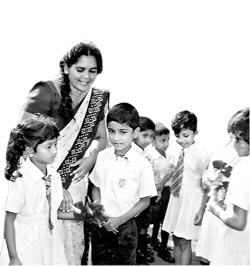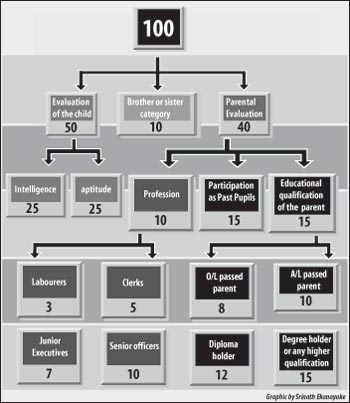
First to chaos, then to schoolAmidst mounting criticism of the Grade One admission selection guidelines proposed by the Supreme Court, the Education Ministry has decided to revert to the old system with certain modifications, The Sunday Times learns. The Education Ministry’s fresh guidelines will avoid the clauses that are seen as violating fundamental rights. Government members and all major political parties are supporting the former selection process with modifications, amidst concerns that next year’s selection process that has run into many a snag would take longer than scheduled leading to a delay in starting classes for year one students.
The new guidelines proposed by the Supreme Court have been rejected by all political parties who claim it could also lead to discrimination of students, particularly if their parents are less educated. Education Minister Susil Premjayantha said that the amended circular will be handed over to President’s Secretary Lalith Weeratunga to obtain the approval of the Supreme Court. He said that as all the MPs were of the view that the 2006 circular is better than the proposed guidelines and as there is no way to use the circular which in invalid now as it was cancelled by the Supreme Court, the Ministry decided on amending it and implement it for 2008, which was the only possible option left. “We hope to start calling for admissions from August 15 onwards”, he added. Meanwhile different political parties gave their views on why they opposed the Supreme Court guidelines. UNP MP and Party Secretary Tissa Attanayake said the party opposed the guidelines because they discriminated against the less educated families. “According to that system, if the father hadn’t passed A/Ls, the child would receive less marks. We also had a problem regarding the committee appointed to select the students ,” he said adding that it was prudent to use the 2006 circular for 2008. Under a clause, “Parental Consideration” according to the Supreme Court guidelines, 8 marks were to be given to a parent who had passed O/Ls, 10 for A/Ls, 12 for a Diploma holder and 15 for Degree holder. Thus, according to the national percentages, only 18.8% of the parents who have passed O/L would get sufficient marks, 9.4% who had passed A/L examination and 1.1% who hold degrees would get enough marks when admitting their children to Grade One. “The Supreme Court only came up with guidelines. If they are not suitable enough, Parliament can come up with alternatives. Parliament can fix rules. So, we can decide whether to implement the 2006 circular for 2008 or not. We can discuss and come up with a proper Parliament-approved-plan for 2009 admissions,” Mr. Attanayake said. However, JVP MP Vijitha Herath said that as Parliament had authority over the Supreme Court only by passing an Act and as they hadn’t done it, the Court could stand in their way.
“We cannot use the 2006 circular as it has been rejected by the Supreme Court. We can amend it and use it for 2008, but for that too we would have to get the permission of the Supreme Court ,” He said. He too pointed out that the guidelines suggested by the Supreme Court went against protecting equal rights of the students as they were being judged by their parents’ educational qualifications and professions. According to the Supreme Court guidelines a labourer gets 3 marks when admitting his child to school, a clerk 5, a junior executive 7 and a senior officer 10. He suggested that a long-term admission system should be set up for Grade One admissions after consultations with educationists, and the public. The religious aspect of the schools should be taken away too as it gives rise to racism among students, he said adding that work should begin on a long term proposal now as it would take time to draft a comprehensive proposal. JHU MP Ven Athuraliya Rathana Thera voicing similar views said the 2006 circular should be used for 2008 and a more comprehensive one should be used for 2009. TNA MP K. Thurairathnasingham said the court should not get involved in education matters by forming guidelines for Grade One admissions. “As a former principal, I know the problems regarding Grade One admissions. I believe a national policy regarding Grade One should be done at the school level as they are the ones familiar with the problem more than the courts,” he said. Lawyer U. Egalahewa who represented parents and teachers, (non-past pupils) in the Supreme Court case regarding the Grade One admissions told The Sunday Times that a problem might arise in implementing a circular cancelled by the Supreme Court if another parent of the 2008 students files a case saying that their fundamental rights too had been violated. “The 2006 circular is now illegal. The only way to overrule the court is through a Parliament Act. But no Act was passed in Parliament. So there could be a problem in implementingg the 2006 circular again,” he said. A spokesperson for the Joint Committee of Past Pupils’ Association Dr. Aruna Rabel said Parliament had now come to the conclusion that the 2006 circular would be best for 2008 while working towards a proper system for 2009—a suggestion the committee had made some time ago. “It was the best solution from the beginning,” he said, adding that some people were taking political advantage of the present confusion. “The Supreme Court verdict was given on March 29. But it is only now that political parties are getting involved,” he said. The Secretary of Sri Lanka Teachers’ Service Association, Mahinda Jayasinghe said though there were problems in the 2006 circular, compared to the proposed guidelines for 2008 the previous circular was better. “It would be better if it could be amended and used for 2008 but I don’t think there is time to sort out all the controversies,” he said adding that it was important to have a proper method not only for Grade One admissions but for other grades as well. According to the normal procedure, applications for Grade One are called in June and the interviews are held during the August vacation. Within 14 days after the temporary list is put out, in October, appeals are taken into consideration. The final list is then displayed before school school term begins in January. However, this time, with applications due to be called only this month, interviews and the system of processing applications will get delayed causing delays in admissions, principals point out.
|
|| Front
Page | News | Editorial | Columns | Sports | Plus | Financial
Times | International | Mirror | TV
Times | Funday
Times || |
| |
Copyright
2007 Wijeya
Newspapers Ltd.Colombo. Sri Lanka. |

